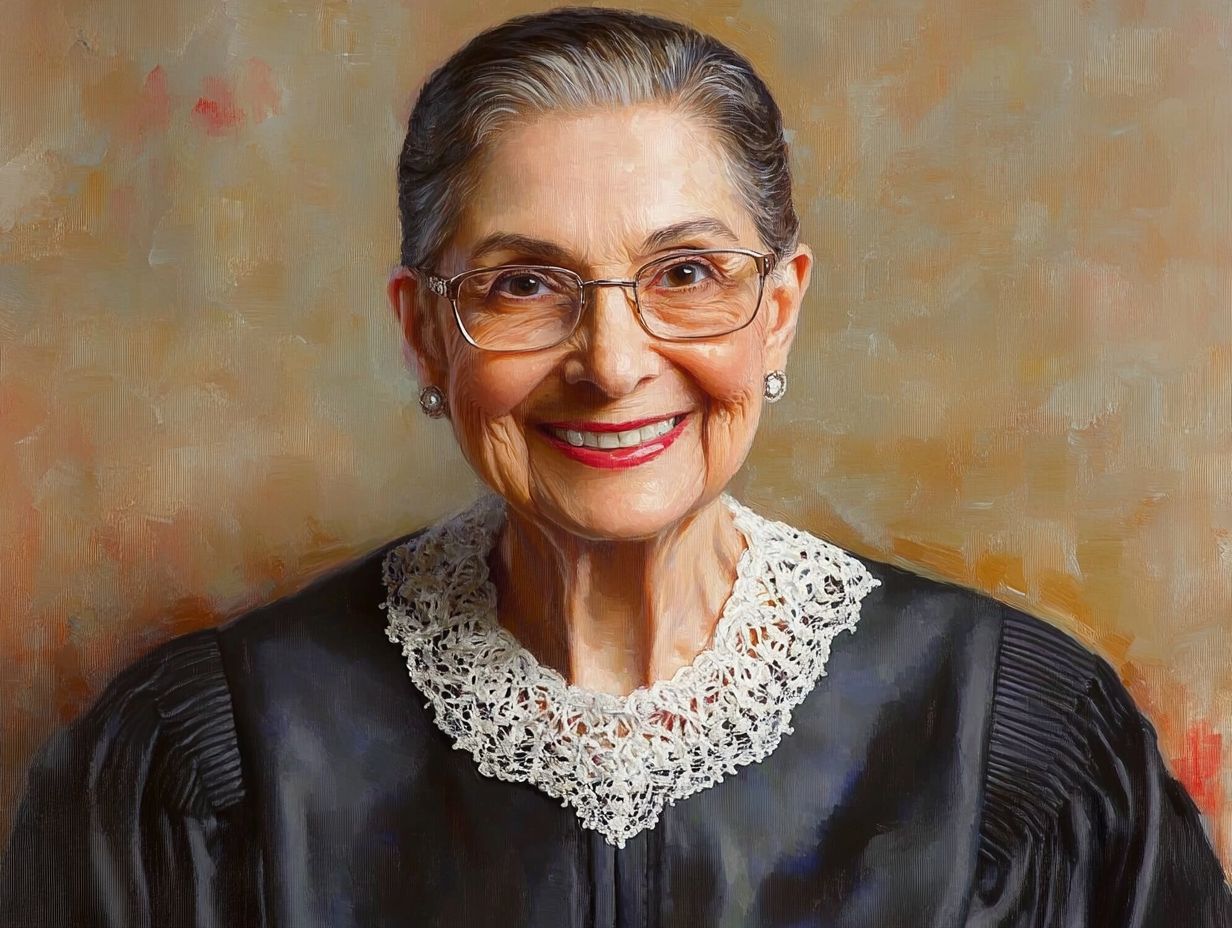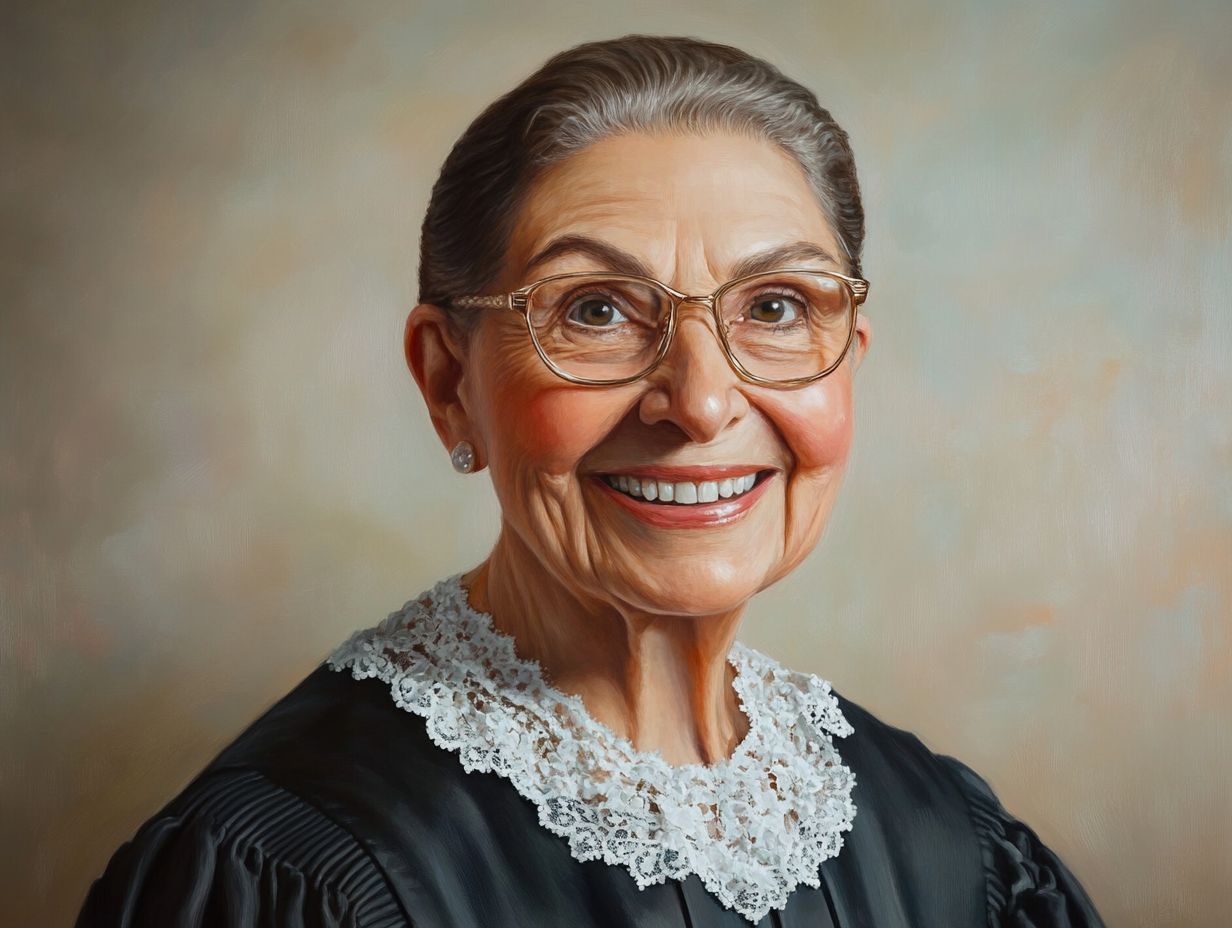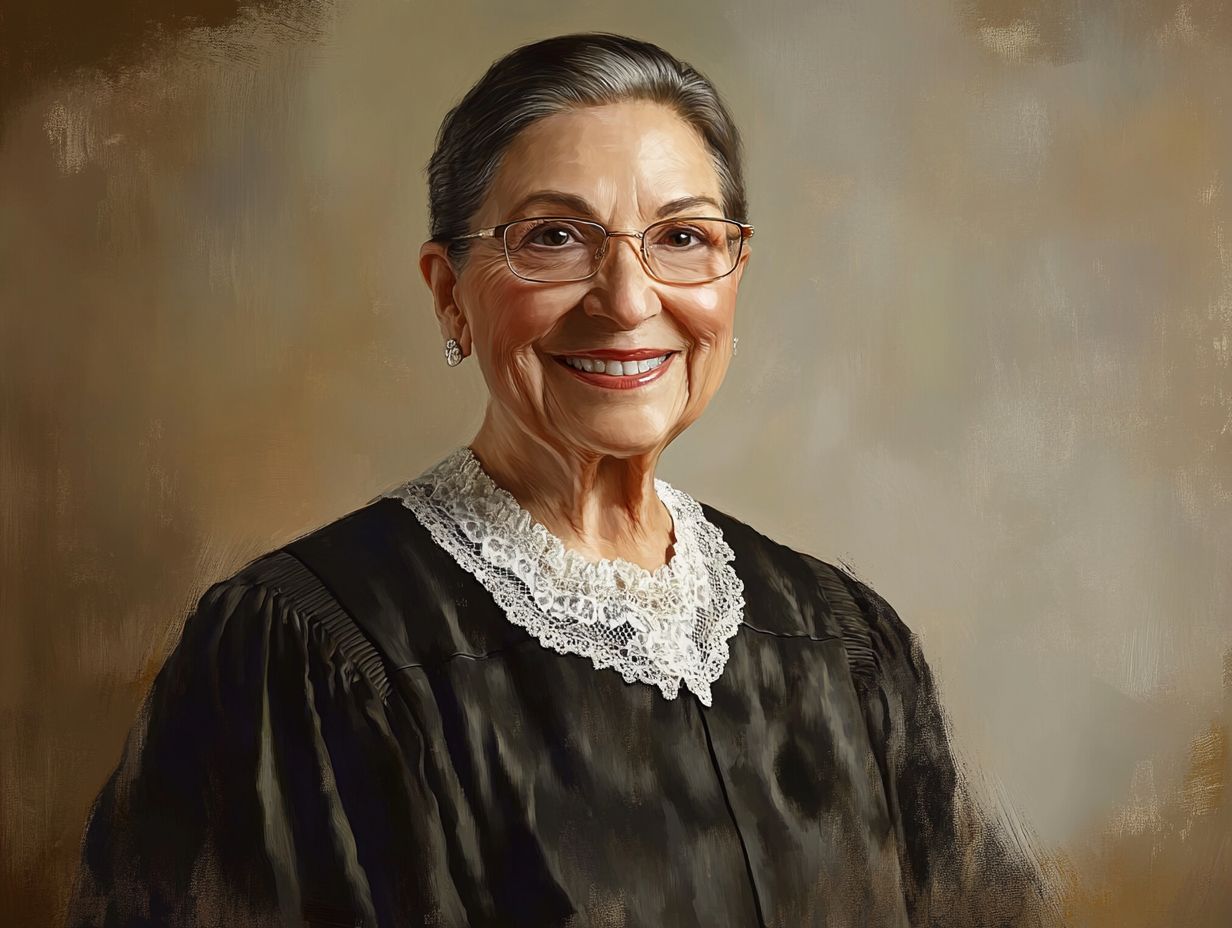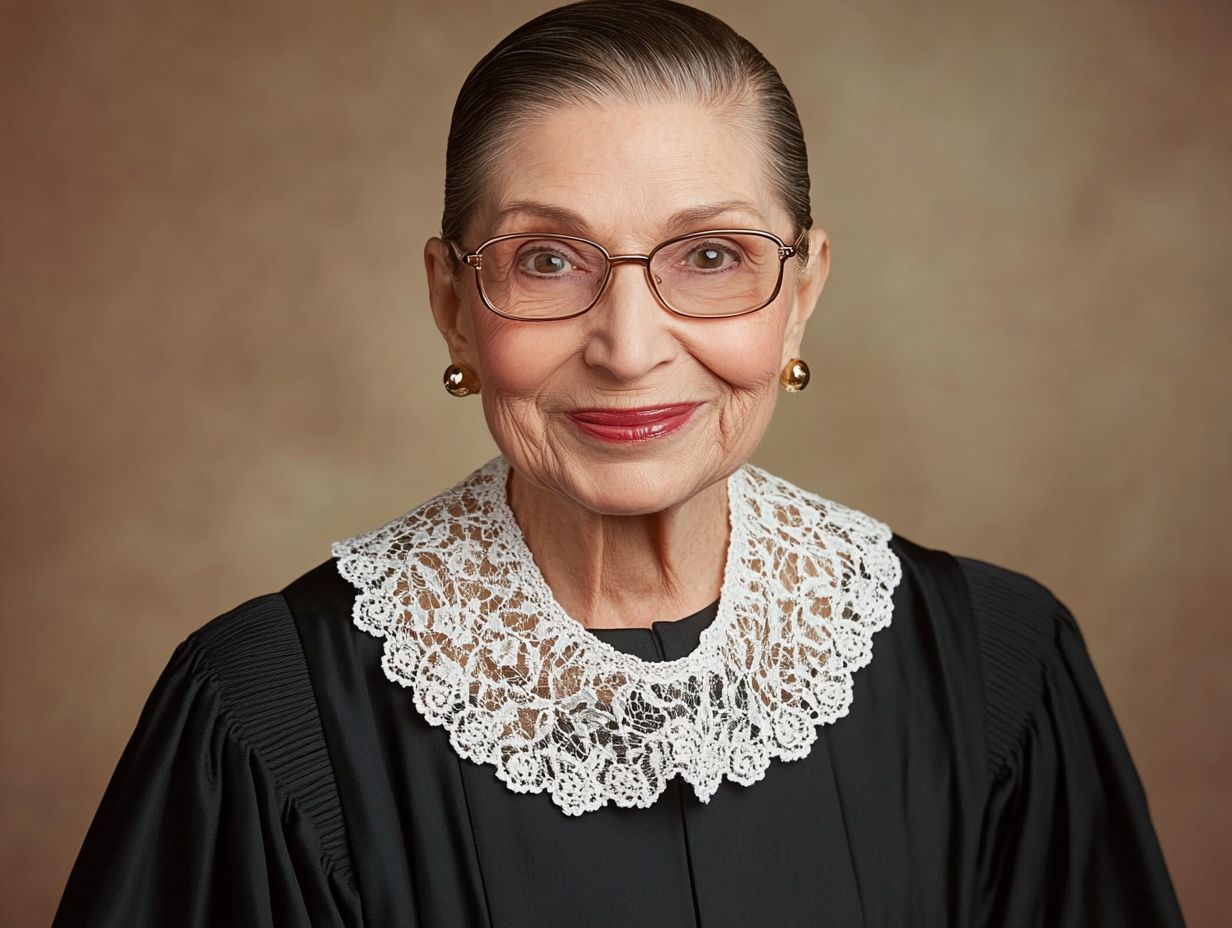Ruth Bader Ginsburg: A Trailblazer for Justice
Ruth Bader Ginsburg is a name that resonates with justice and equality. She carved out an extraordinary path in a male-dominated legal landscape.
From her childhood beginnings and educational pursuits to her groundbreaking efforts in women’s rights, Ginsburg’s influence is nothing short of profound.
Her time on the Supreme Court, characterized by important decisions and impassioned dissents, cemented her legacy as a true champion for justice.
Join us as we explore her inspiring journey from Brooklyn to the Supreme Court!
Contents
- Key Takeaways:
- Early Life and Education
- Legal Career and Advocacy Work
- Supreme Court Nomination and Tenure
- Legacy and Influence
- Frequently Asked Questions
- Who was Ruth Bader Ginsburg and why is she considered a trailblazer for justice?
- What were some of Ruth Bader Ginsburg’s most notable achievements?
- What impact did Ruth Bader Ginsburg have on the legal profession?
- How did Ruth Bader Ginsburg’s personal experiences influence her activism?
- Ginsburg’s Influence in a Male-Dominated Field
- What is Ruth Bader Ginsburg’s Legacy?
- How Has Ruth Bader Ginsburg Inspired Others?
Key Takeaways:

- Ruth Bader Ginsburg overcame societal barriers and championed gender equality through her career in law and advocacy work.
- As a Supreme Court Justice, Ginsburg’s important decisions and dissents have shaped the legal landscape and advanced women’s rights.
- Ginsburg’s legacy continues to inspire and influence future generations, leaving a lasting impact on the legal system and society as a whole.
Early Life and Education
Ruth Bader Ginsburg, a towering figure in the legal realm, hails from Brooklyn, New York. Her childhood experiences and family background profoundly influenced her values and ambitions.
The foundation of her early education at public schools in Brooklyn set the stage for her impressive academic journey through Cornell University, Harvard Law School, and Columbia Law School. It was here that she emerged as a trailblazer, championing women’s rights and principles of equality within the legal landscape.
Childhood and Family Background
Growing up in Brooklyn, Ruth Bader Ginsburg was profoundly shaped by her family’s values and unwavering work ethic. This nurturing atmosphere made her acutely aware of the subtle yet pervasive gender biases that surrounded her.
Her parents, especially her mother, emphasized the significance of education and resilience. They frequently recounted tales of women who defied societal norms to chase their dreams.
As a child, witnessing her mother navigate obstacles in both the professional and personal realms, Ruth began to internalize the struggles faced by women in her community. One particular incident from her school days, where she was denied a role in a play solely due to her gender, left an indelible mark on her.
Rather than discouraging her, this experience ignited a fierce determination to champion equality. It shaped her views on social justice that would later become the bedrock of her life’s work.
Education and Career Beginnings
Ruth Bader Ginsburg’s educational journey started at Cornell University, where she earned her bachelor’s degree. She then ventured into the rigorous world of Harvard Law School, where she faced the challenges of gender inequality head-on.
Ultimately, she transferred to Columbia Law School to complete her law degree. Even as one of the few women in her classes, she didn’t just survive; she thrived, becoming the first woman to serve on the esteemed Harvard Law Review.
Each setback only fueled her determination as she skillfully navigated a terrain dominated by male peers and professors. From the beginning, she envisioned a legal landscape transformed one where women could rightfully claim their place in society.
Her contributions to academic journals and legal discussions established her as a formidable voice in the field. Early internships and clerkships provided her with vital insights into the systemic barriers women faced, laying the groundwork for her lifelong commitment to advocating for women s rights.
Legal Career and Advocacy Work
Ruth Bader Ginsburg’s legal career exemplifies an unwavering commitment to advocacy. She played a crucial role in her influential work with the ACLU Women s Rights Project.
In this role, she spearheaded groundbreaking legal battles against gender discrimination, tirelessly championing women’s equality within the legal framework.
Her relentless pursuit of justice not only transformed the landscape of women’s rights but also inspires countless individuals to uphold the values of equality and fairness.
Ruth Bader Ginsburg’s story is a powerful reminder of the ongoing fight for equality one that continues to inspire us all.
Notable Cases and Achievements
Ruth Bader Ginsburg’s career is marked by significant cases against gender discrimination. She achieved victories that advanced equality in law and society.
A landmark moment was the case Reed v. Reed in 1971. Here, she argued against gender-based preferences in probate law, marking the Supreme Court’s first acknowledgment of gender discrimination violating the Equal Protection Clause.
She championed equal opportunities for women through Title IX. In Ledbetter v. Goodyear, her powerful dissent highlighted the wage gap and called for immediate pay reforms.
These court battles reshaped legal interpretations and inspired a generation of activists dedicated to women s rights.
Impact on Women’s Rights

Ruth Bader Ginsburg’s impact on women’s rights extends beyond her legal wins. She is a feminist icon who inspired many advocates for social justice.
Her commitment to equality pushed for educational rights, ensuring women had equal chances in academics. Through pivotal cases, she challenged laws that restricted women’s progress.
Her persona resonated across different demographics, making her a cultural phenomenon. She appeared in films and documentaries that celebrated her legacy and mobilized a wider audience to fight for women’s rights and social change.
Supreme Court Nomination and Tenure
The nomination of Ruth Bader Ginsburg to the U.S. Supreme Court in 1993 by President Bill Clinton was a historic milestone. This solidified her role as a key figure in the Court and showcased her dedication to women’s rights.
Nomination and Confirmation Process
Ginsburg’s nomination marked a critical moment in American politics, with significant partisan divisions. She faced scrutiny for her legal credentials and her progressive views on various social issues.
The confirmation hearings became a battleground for her judicial philosophy. Ginsburg emphasized a thoughtful approach to justice and addressed challenges from opponents who sought to undermine her views.
Her articulate defense resonated with many, leading to her historic appointment to the nation’s highest court.
Key Opinions and Dissents
During her tenure on the Supreme Court, Ruth Bader Ginsburg authored several pivotal opinions and notable dissents that underscored her commitment to voting rights and her nuanced approach to constitutional interpretation.
Her strategic legal reasoning didn’t just spotlight the biases embedded in existing laws; it also set a powerful precedent for tackling deep-rooted inequalities in society. In her dissenting opinion in cases like Shelby County v. Holder, she fervently argued against the erosion of voting rights, emphasizing how crucial it is to safeguard access for all citizens.
Ginsburg’s legal arguments often wove together the threads of gender equality, illuminating how discrimination impacts various demographics. The implications of her work resonate far beyond her time on the bench, continuing to influence future cases as new generations of lawyers and judges navigate the ever-evolving landscape of civil rights.
Legacy and Influence
Ruth Bader Ginsburg’s legacy goes far beyond her remarkable judicial contributions; her impact on the legal system and society is profound.
She inspires future generations to carry on the fight for women’s equality and social justice, leaving an indelible mark on the ongoing fight for a fairer world.
Impact on the Legal System and Society
Ruth Bader Ginsburg’s contributions to the legal system have not only advanced women’s rights but also reshaped our understanding of gender equality and justice.
Through her thoughtful rulings and powerful dissents, she effectively challenged discriminatory practices and illuminated the injustices women face in various sectors, including employment and education.
Her influence reached beyond the courtroom, permeating public consciousness and inspiring countless others to advocate for equal rights.
Ginsburg skillfully navigated societal norms, proving that gender equality is not just a legal obligation but a fundamental human right. The cultural legacy she crafted, marked by fierce determination and unwavering commitment, prompted legislative changes that further safeguarded women’s rights, laying a strong foundation for future advancements in gender equality.
Inspiring Future Generations

Ruth Bader Ginsburg stands as a powerful role model for future generations, illustrating how perseverance and unwavering commitment can drive significant progress in women’s rights and equality.
Her incredible journey, packed with groundbreaking achievements, lights the way for young lawyers, activists, and women pursuing careers across various fields. Inspired by her tenacity, numerous initiatives and programs have sprung up to honor her legacy and advance the cause of gender equity.
These efforts aim to enable individuals through education, mentorship, and advocacy, shaping a generation ready to confront injustices head-on.
By prioritizing the importance of mentorship, these programs foster a nurturing environment that echoes Ginsburg’s own experiences, encouraging women to rise within the legal profession and beyond, ensuring that her fight for equality remains steadfast and unyielding.
Frequently Asked Questions
-
Who was Ruth Bader Ginsburg and why is she considered a trailblazer for justice?
Ruth Bader Ginsburg was a Supreme Court Justice and legal pioneer who dedicated her career to fighting for gender equality and civil rights. Her remarkable journey, detailed in the remarkable story of Ruth Bader Ginsburg, showcases how she paved the way for women in the legal profession and became a cultural icon for her unwavering commitment to justice.
-
What were some of Ruth Bader Ginsburg’s most notable achievements?
As a lawyer and judge, Ginsburg fought for women’s rights, including the Equal Rights Amendment and the right to access birth control. She also wrote landmark opinions on gender discrimination, voting rights, and the rights of lesbian, gay, bisexual, transgender, and queer individuals during her time on the Supreme Court.
-
What impact did Ruth Bader Ginsburg have on the legal profession?
Ginsburg’s work played a significant role in shaping the modern legal landscape. She helped break barriers for women in the legal field and inspired countless others to fight for justice and equality.
-
How did Ruth Bader Ginsburg’s personal experiences influence her activism?
Ginsburg’s personal experiences shaped her understanding of injustice and fueled her activism, driving her to advocate for change in the legal system.
To learn more about Ruth Bader Ginsburg’s legacy and get involved in advocacy work, consider exploring local organizations dedicated to gender equality and civil rights.
Ginsburg’s Influence in a Male-Dominated Field
Ginsburg faced discrimination and obstacles throughout her career as a woman in a workplace where men held most positions of power. These experiences fueled her passion for fighting gender inequality and advocating for marginalized communities.
What is Ruth Bader Ginsburg’s Legacy?
Her legacy shines with courage and determination. Ginsburg will be remembered as a trailblazer and a role model for generations to come.
How Has Ruth Bader Ginsburg Inspired Others?
Ginsburg’s impact has inspired countless individuals, especially women and marginalized communities. She remains a powerful source of motivation for those fighting for justice and equality.






